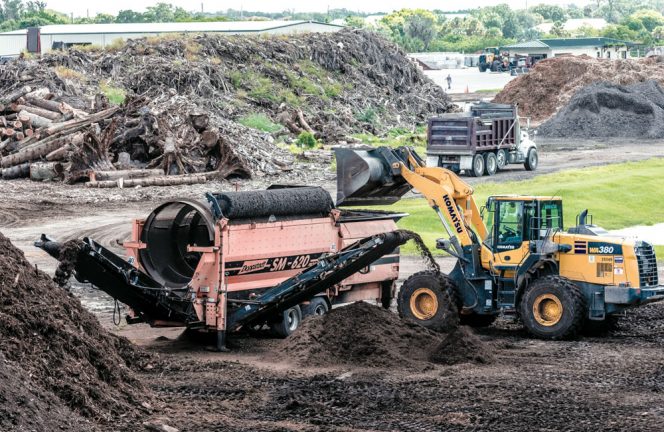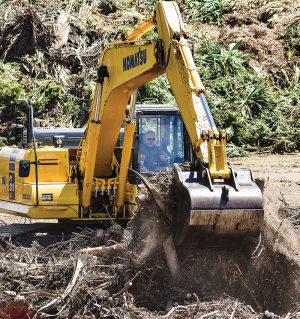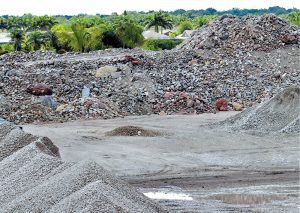Niki Vala and Craig Coker
BioCycle August 2017

Sarasota-based 1 Stop Landscape Supply & Yard Waste Recycling Facility processes about 70,000 tons/year of yard trimmings, land clearing debris and pallets. Photo by Eric Wells, 1 Stop Landscape Supply and Yard Waste Recycling Center
Since its inception, 1 Stop’s equipment has been anchored by Doppstadt, supplied by Ecoverse. “We got our first DW 3060SA shredder and SM 620 trommel in 2004,” recalls Desrosiers. “Back when the trend in equipment emphasized fuel-hungry high speeds [grinders], we broke away from convention and invested in a slow-speed shredder and trommel.” His current operation takes in yard trimmings, land clearing debris, pallets, and concrete slab debris and paver wastes from his brick paver company. All of it goes through the slow-speed shredder.

John Desrosiers (in excavator cab) started 1 Stop after recognizing a need for a reliable organics recycling operation in the greater Tampa/Sarasota market in Florida. Photo by Eric Wells, 1 Stop Landscape Supply and Yard Waste Recycling Center
At the new site, 1 Stop Landscape Supply produces compost, mulches and soils. The 2-inch minus ground yard trimmings are composted in windrows turned with front-end loaders; residence time is six months. Desrosiers is experimenting with the shredders to see if he can make a pine needle type mulch from palm tree trunks, which are very fibrous. The trunks are run through the shredder, then through the high-speed grinder, and then through a trommel screen, but Desrosiers is dissatisfied with the product. “I need to use a 2-inch or 3-inch screen on the trommel, as the three-quarter-inch screen I have doesn’t yield enough unders to make a good needle-type mulch,” he says.
1-Stop makes its soil blends by bucket blending on the ground, then running the rough blend through one of the trommels to mix it more thoroughly. The new site had plenty of raw material to support soil blends. “This used to be a potato farm, and the entire site was covered with a rich topsoil, as much as three to four feet deep in some places,” explains Desrosiers. “We tested it and it came back with a pH of 5.9 which is just awesome for topsoil. We have a tremendous stockpile of it.”

When the company decided to expand into the recycled construction materials market, it discovered that its slow-speed Doppstadt shredders could be used to grind brick paver waste and concrete debris. Photo by Eric Wells, 1 Stop Landscape Supply and Yard Waste Recycling Center
Concrete And Paver Shredding
Desrosiers also uses the slow-speed shredders to grind brick paver waste and concrete debris. “Why not?,” he asks. “We saw an opportunity to do concrete, and I wasn’t about to spend upwards of $1 million on a dedicated concrete crusher when I already had this machine. We just operate the shredder at its engine idle speed and it churns out a rough 5-inch minus product that we screen through our trommel to produce a whole host of different material sizes. The concrete simply fractures, cracks and falls away. It works great.”
The concrete has no negative impact on the machine, adds Desrosiers: “We use smaller teeth on the comb; the trapezoidal teeth tend to be more aggressive. But we actually find that shredding wood is far more abrasive on the machine than concrete. You need to watch out for rebar, but the [automatic breakaway comb] accumulator on the Doppstadt is what makes this possible. Any resistance and the hopper just dumps and we move on.”
Several products are made from the concrete debris, including a 5-inch clean (screened) aggregate, a clean #57 stone (a particular stone specified by Florida Department of Transportation to be 1- to 1.5-inches in size), both 2.5- and 5-inch stone with fines (unscreened) and a “250 sand” made of fines that meet the particle size for driveways and walkways. Desrosiers also makes a 250 sand from the brick paver wastes using the slow-speed shredder.
Desrosiers is also interested in composting food waste, but is waiting until 1 Stop has the necessary infrastructure. The company also has created 26 one-acre parcels for a “biomass recycling park,” he adds. “Each acre plot has access to water, sewer and electricity. We expect our first ‘tenant’ to be a biochar company that will use our shredded hardwood and pallets to make the charcoal.”
Niki Vala is the Marketing Coordinator for Ecoverse (Avon, OH). Craig Coker is a Senior Editor at BioCycle and CEO of Coker Organics Recycling. Learn more about 1 Stop at www.1stoplandscapefl.com










